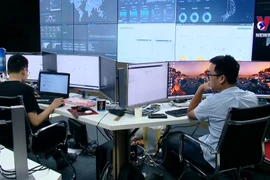
Hanoi (VNA) - How can Vietnam harness the power of AI to drive economic growth and achieve its goal of becoming a high-income country by 2045? This was the main topic of the “Shaping the AI Future for Vietnam” seminar, jointly organised by the National Innovation Centre (NIC), the Ministry of Planning and Investment, and Google, on November 15.
At the event, Deputy Minister of Planning and Investment Do Thanh Trung highlighted the critical role of AI in Vietnam’s socio-economic development strategy.
He said the Ministry has submitted to the Prime Minister for approval a programme on human resource development for the semiconductor industry by 2030, with a vision to 205.
The programme sets a target of training at least 5,000 engineers with advanced AI expertise by 2030 to serve the semiconductor industry.
The NIC has been tasked with collaborating with domestic and international partners to establish an AI training, research, and application centre.
The centre will support AI business incubation, research, application and in-depth training on AI with the goal of training 7,000 experts meeting international standards and incubating 500 startups by 2030.

On the occasion, Google released a report on “AI Opportunity Agenda for Vietnam,” which highlights the huge potential of AI in Vietnam and estimates economic benefits worth up to 1.89 trillion VND (79.3 billion USD) from AI by 2030, making up nearly 12 percent of the country’s GDP.
To fully tap AI’s full potential, Google experts emphasise the need to strengthen Vietnam’s digital infrastructure, build an AI-ready workforce, and expand access to AI technologies across the economy.
The report also proposes strategies to close the digital and AI knowledge gap, enabling Vietnam’s workforce to effectively leverage AI for driving economic growth.
In addition, the report recommends that Vietnam implement effective policies to retain and nurture the country's talent pool, such as expanding access to digital education and promoting corporate training programmes.
According to the report, narrowing the digital skills gap is projected to contribute an additional 658.6 trillion VND (25.9 billion USD) to GDP by 2030.

Google’s report also highlights Vietnam’s impressive economic growth, from a low-income to middle-income country and its goal of becoming a high-income country by 2045.
To realise this goal, AI is identified as a new growth driver, especially in the context of a rapidly developing digital economy.
In addition, AI has the potential to boost such sectors as e-commerce and logistics.
Andrew Ure, Google’s Senior Director of Government Affairs and Public Policy for Southeast Asia, expressed optimism about Vietnam’s AI potential, citing the country’s young, tech-savvy population and dynamic digital environment.
Vietnamese businesses are actively applying AI, especially in the financial sector. The government has issued strong support policies through the National AI Strategy, aiming to turn Vietnam into an AI innovation hub by 2030./.



























